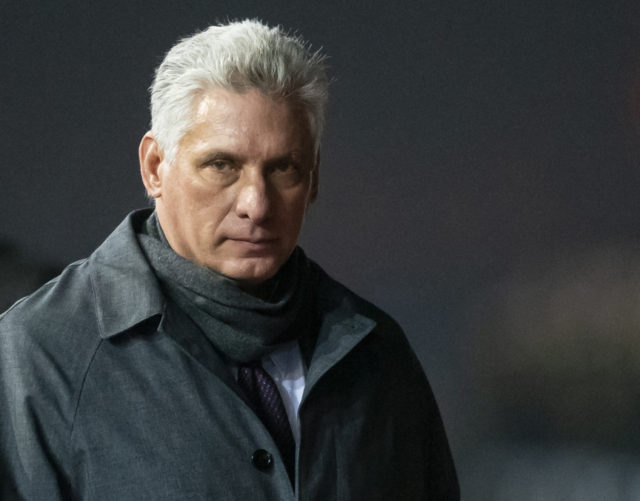Cuban President Miguel Díaz-Canel, who answers to Communist Party leader Raúl Castro, announced on Wednesday that he will soon launch a YouTube channel and a television program intended to bring him “closer to the people.” Díaz-Canel also said he aspires to expand the presence of the Castro regime on social media to combat “adverse information.”
Since assuming the Cuban presidency from the younger Castro brother in April, while leaving the dictator control over both the Cuban military and the Communist Party, Díaz-Canel has struggled to convince the world that he possesses legitimate power over the Cuban government. He has largely served as Castro’s ambassador, traveling around the world and meeting like-minded activists in New York, China, and North Korea.
If he does launch his own television program, Díaz-Canel will follow in the footsteps of Venezuelan dictator Hugo Chávez and Nicolás Maduro, who of whom hosted or currently host multi-hour television programs.
Fidel Castro, who led Cuba for most of the post-revolutionary period, often delivered day-long speeches on Cuban television, which strictly bans programming not favorable to the regime.
“Those of us who have decisive roles and are public servants owe coherent and direct information to the population and, altogether, should do what Fidel did alone,” Díaz-Canel said on Tuesday before the Cuban National Assembly, the communist legislature. He emphasized that “all ministers in the country” must allow themselves to be “held accountable” by the people through appearances on state-run television. He noted that he had asked all the ministers to appear on television before the next meeting of the assembly but they failed to do so because of time restrictions.
To solve the problem, Díaz-Canel proposed even more hours of state-sponsored propaganda featuring Communist Party personalities through the launch of a new television network.
Díaz-Canel also emphasized the need for the Communist Party to use other venues, particularly social media on the internet, to spread propaganda.
“We should better take advantage of technological conditions and spaces we can count on to make sure that Revolutionary content is present in social media,” he advised. He contrasted the “Revolutionary content” to “adverse information” – content that challenges the Cuban regime – which he stated the government should aspire to drown out of the internet.
Social media, he continued, was a venue for “ideological combat” that should not be surrendered to pro-democracy voices. While insisting on multiplying the number of Cuban voices online, he emphasized that those who did not agree with the communist regime were strictly excluded from this goal and that the regime must combat the spread of “subversive” platforms.
“We will advance without allowing ourselves to be dazzled by the perverse proposals of the Empire,” he said, referring t the United States. “The government will keep advancing without needing interventionist platforms they want to impose on us.”
Despite his rejection of American platforms, the Cuban president identified Youtube as a desired content platform for the Revolution. Díaz-Canel also opened a Twitter account in August, primarily using it to share Fidel Castro quotes or attack the United States. He appeared on Twitter after the outlet shut down dozens of “bot” accounts spreading communist propaganda using celebrity and stock photos.
On Wednesday, Díaz-Canel celebrated that all the members of his cabinet were on Twitter, Foreign Minister Bruno Rodríguez the last one to join.
Con @BrunoRguezP ya están presentes todos los ministros cubanos en las redes sociales. Bienvenido hermano canciller. #SomosCuba #SomosContinuidad
— Miguel Díaz-Canel Bermúdez (@DiazCanelB) December 19, 2018
Cuba’s online archives contain hours of Fidel Castro using television to spread propaganda and deliver extensive speeches, which rarely competed with programming on other channels. Díaz-Canel’s program may be more akin, however, to the Venezuelan socialist regime’s iteration of state propaganda.
Nicolás Maduro is currently the host of a Sunday evening program called In Contact with Maduro, which features hours of Communist Party songs, interviews with members of the government, and denunciations of the United States. Maduro also hosts a radio program called Salsa Time dedicated to the tropical music genre.
Diosdado Cabello, one of Maduro’s closest confidants and the head of the illegal “national constituent assembly,” also hosts a television program titled Con el mazo dando (“Hitting with the Mallet”), which he often uses to deny the ample evidence that he is one of the wealthiest cocaine traffickers in Latin America.
Under Hugo Chávez, Venezuelans were regaled with a weekly program called Aló Presidente, typically featuring a combination of leftist rants, interviews with regional leftists, and the occasional sing-along.

COMMENTS
Please let us know if you're having issues with commenting.